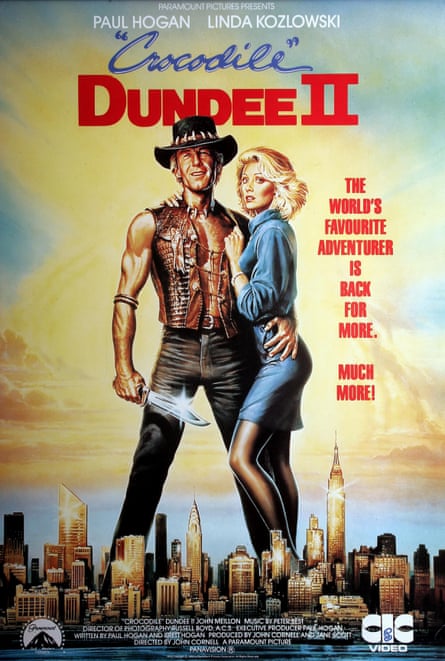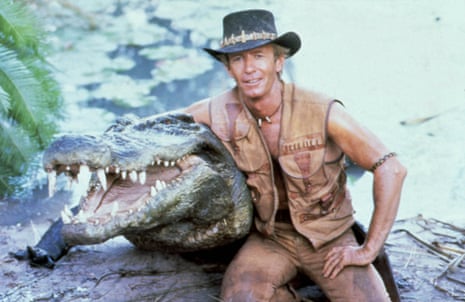At the weekend confusion, incredulity and fear for the future of humankind spread like wildfire across certain sectors of the web – all hell unleashed by a 38-second video.
The video in question purports to be a teaser trailer for a film called Dundee: The Son of a Legend Returns Home. It shows the US comedian Danny McBride apparently playing the offspring of Paul Hogan’s famous knife-comparing, Akubra-wearing rube.
Could this be true? Could Crocodile Dundee be getting a reboot? Wild conspiracy theories began making the rounds: this is some sort of Super Bowl advertisement, posited some; others that it’s like that Ferris Bueller-related cash grab from 2012.
Hogan told People Magazine: “I’m excited to introduce the new Crocodile Dundee to the world,” and he described the film as one “that has stood the test of time”.
So if we assume the unthinkable: that this project is actually going ahead (though Screen Australia has not confirmed it), what would Dundee: The Son of a Legend Returns Home need to do to capture the spirit of the original three Crocodile Dundee movies, released in 1986, 1988 and 2001?
For starters, in addition to being vulgar and witless, the new film would need to be sexist, racist, homophobic and transphobic. It would need to have awkward jokes unfunny at the time of release and even less amusing when revisited years later.
Take, for example, a scene from the original film, based in a pub in New York. Mick Dundee (Hogan) chats up a trans woman, before a friend pulls him aside: “I’ve been trying to tell you all night, that girl, she’s a guy!” Dundee responds by sexual assaulting her. He grabs the woman in the groin area, then points and yells: “A guy dressed up like a sheila! Look at that!”
The pub erupts into laughter and applause. There are high fives and back slaps.
Dundee sexually assaults another women later on, in the same way, at an art gallery. His love interest Sue (Linda Kozlowski) consoles the distraught woman by saying: “It’s OK, he’s Australian.”
In the 1988 sequel, which manages to be both offensive and boring, the protagonist steps out on a ledge in a skyscraper, to convince a suicidal man not to jump. The broken-hearted fellow tells him: “I loved that bitch.” Dundee consoles the stranger and gives him a hug.

When the man continues to reflect on his lover, adding “he betrayed me”, Dundee is so shocked to learn the man is gay that he recoils from their embrace and nearly falls off the building. The strong implication is that, had he known the man was homosexual, he would never have tried to save him in the first place.
Sue, a journalist, initially appears to have a reasonable amount of agency, before we learn she is dating her editor and her father is the publisher. During a quiet scene in the original movie (directed by Peter Faiman and written by Hogan, Ken Shadie and John Cornell), Sue complains to Dundee about a previous lover. She says this guy is a lefty type, “probably marching right now, for the gay Nazis or something”.
Dundee, disgusted, tells her he “sounds like a prize ratbag”. He then discusses land rights and Indigenous Australians. They “don’t own the land, they belong to it”, he says, going on to compare people discussing land ownership to “fleas” debating “who owns the dog”.
The Crocodile Dundee films were phenomenally popular at home (where the original is still the most successful of all time) and in the US. Box Office Mojo estimates the trilogy grossed about US$700m (adjusted for inflation), in addition to a whopping amount accumulated on ancillary markets.
Designed to appeal to US audiences first and foremost, and subsequently exploiting Australia’s inferiority complex, Crocodile Dundee confirmed false preconceptions Americans had (and perhaps still have) about Australia and Australians. These movies constructed a conservative fantasy, where white hetero males do all the hard work and are justly rewarded, and where everybody else, including “the sheilas”, “the Aborigines” and “the gays”, understand their place in the pecking order – which is somewhere below people like Dundee.
The writers are unsure whether to paint Dundee as a Barry McKenzie-esque decorum destroyer, flying in the face of decency and politeness, or a fearless knife-wielding action hero. He is subsequently both, and neither. You can’t take Dundee seriously as a hero, nor laugh away what he says and does as the behaviour of an idiot and a blunderbuss.
There is a suggestion the man’s sometimes casual, at other times brusquely direct racism and sexism is acceptable because he doesn’t know any better. At the same time we are told he is some kind of mystically minded genius, because he was raised by a tribe of Indigenous Australians. This apparently gives Dundee the right to speak on their behalf, and rib them in various ways.
“Now look who’s the white man!” Dundee says to an Indigenous friend in the third film, Crocodile Dundee in Los Angeles, when his pal answers a call on his mobile phone (hilarious!). The jokes generally either belittle minority groups, or poke fun at Dundee himself.
These are cynical, opportunistic films, dripping with contempt for their audience. From this point of view, there is one thing the new “trailer” gets absolutely right: it encapsulates the franchise’s shameless stereotype-mongering and disdainful attitude towards viewers. All in an ultra-efficient two words, when Danny McBride stares into the camera and says: “G’day, losers.”

